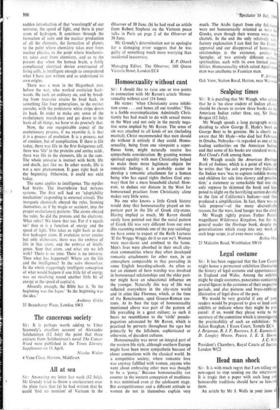Homosexuality without cant
Sir: I should like to raise one or two points in connection with Mr Raven's article `Homo- sexuality without cant' (14 June).
He states: 'when Christianity arose inhibi- tion arose . . . and hence all our troubles.' This is a feeble oversimplication. Admittedly Chris- tianity has had much to do with sexual mores in the West and not only in the merely nega- tive sense implied by Mr Raven. The sense of sin was attached to all kinds of sex (including marital); Christ recommended that men should do without it entirely if they could. Homo- sexuality, being from one viewpoint a super- fluous form, might naturally receive less sympathetic consideration. By granting women spiritual equality with men Christianity helped to make them more legitimate objects for romantic feelings; it is probably easier to develop a romantic attachment for a human being who has equal rights (before God any- way) than for a mere household chattel. How- ever, to deduce our distaste in the West for homosexual practices from Christianity alone makes very little sense.
No one who knows a little Greek history would deny that homosexuality played an im- portant part in the life of Greek city-states. Having implied as much, Mr Raven should surely have pointed out that the social pattern of Greek life was very different from our own (his reasoning reminds one of the pop sociology we have come to expect of the Reith Lectures `If the Wogga Wogga do it so can we'). Women were near-slaves and confined to the home. Men's lives were absorbed in their small city- state communities where they often developed romantic attachments for other men, in an atmosphere comparable to that prevailing in some English boarding-schools. As often as not an element of hero worship was involved in homosexual relationships and the older part- ner might have an educational influence on the younger. Naturally this way of life was reflected everywhere in the city-state world and in cities like Florence, which, at the time of the Renaissance, aped Graeco-Roman cus- toms. At its best the type of homosexuality mentioned above was part of the pattern of life prevailing in a great culture; as such it bears no resemblance to the 'virile' pseudo- paganism advocated by Mr Raven, which is practised by perverts throughout the ages but primarily by the fellaheen, sophisticated or otherwise, of decadent cultures.
Homosexuality was never an integral part of the western life style, although southern Europe might have been more sympathetic because of closer connections with the classical world. In a competitive society, where romantic love was anyway fulfilled with women, anyone who went about embracing other men was thought to be a 'pansy.' Because homosexuality ran counter to the western conception of manliness it was minimised even at the adolescent stage. But competitiveness and a different attitude to women do not in themselves explain very
much. The Arabs (apart from city fellaheen) were not homosexually oriented as were the (reeks, even though their women were near. chattels. In the end the only relatively satin. factory explanation I can find for the Greek, approval and our disapproval of homosexual relationships is the existence, posited by Spengler, of two entirely different cultural spiritualities, each with its own limited possi. bilities. Homosexuality which suited Apollonian man was anathema to Faustian man.
V. Johnsen Oak View, Station Road, Hatton, near Warwick






































 Previous page
Previous page